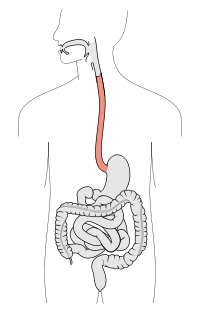
Photo from wikipedia
Abstract Introduction Motor Neurone Disease is a rapidly progressing, fatal and relatively rare neurodegenerative disease of unknown etiology. People diagnosed with Motor Neurone Disease develop a range of symptoms including… Click to show full abstract
Abstract Introduction Motor Neurone Disease is a rapidly progressing, fatal and relatively rare neurodegenerative disease of unknown etiology. People diagnosed with Motor Neurone Disease develop a range of symptoms including dysphagia (swallowing impairments). Although generally recognized to cause serious medical and psycho-social consequences, little is known how this population experiences dysphagia. Aim To investigate the experiences of dysphagia from the perspective of people diagnosed with Motor Neurone Disease. Method This study employed Interpretative Phenomenological Analysis to investigate the experiences of dysphagia in ten people with Motor Neurone Disease who participated in individual, multiple interviews (n = 44) and meal-time observations. Results Participants’ experiences of dysphagia were inseparable from their broader experience of Motor Neurone Disease. Apart from specific circumstances and when dysphagia was severe, dysphagia was not experienced as a constant issue for participants. Participants reported a changed perception of food and fear of choking. They generally aimed to manage dysphagia independently rather than seeking professional help and employed strategies such as choosing easy to swallow foods and limiting mealtime distractions. Conclusion This study provides a unique contribution in advancing our understanding of dysphagia in Motor Neurone Disease. Professionals need to view dysphagia within the disease as a whole, and recognize personal values, preferences and coping strategies of people with Motor Neurone Disease, in the management of dysphagia. IMPLICATIONS FOR REHABILITATION Recognizing the experiences of dysphagia in Motor Neurone Disease contributes to provision of patient-centred care. Professional services for dysphagia should consider the overall experience of living with Motor Neurone Disease rather than focusing on dysphagia alone. Some people with Motor Neurone Disease wish to manage dysphagia alone. Research and intervention should focus on how to support people with Motor Neurone Disease in doing so. Although dysphagia causes multiple consequences in Motor Neurone Disease it may not be perceived as a constant issue by people with Motor Neurone Disease. Communication impairment may be a bigger concern than dysphagia for some people with Motor Neurone Disease.
Journal Title: Disability and Rehabilitation
Year Published: 2019
Link to full text (if available)
Share on Social Media: Sign Up to like & get
recommendations!